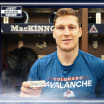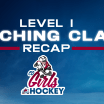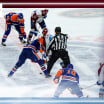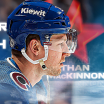Colorado Avalanche director of amateur scouting Alan Hepple discussed the 2019 NHL Draft during a conference call with media members on Thursday morning.
This year's draft will be held at Rogers Arena in Vancouver, British Columbia, on June 21-22. The Avalanche currently has eight picks, which includes two in the first round (No. 4 and 16) and five in the first three rounds.
Alan Hepple Previews 2019 NHL Draft
Alan Hepple talks about the upcoming 2019 NHL Draft
Here is the transcript of Hepple's conference call:
On centers Kirby Dach, Alex Turcotte and Dylan Cozens that could be available at No. 4:
"Two of them play in the Western Hockey League, with Cozens playing in Lethbridge.
"[Cozens is a] big centerman, skates well, has some skill, a guy that sees the ice very well. All these kids are 17-year-old kids. You will have to get stronger, they all do.
"Dach is very close, very comparable. A little bit bigger, a guy who controls the puck on the power play, can control the puck well on the wall, and again he's another guy, he's 6-foot-4, 200 pounds, so he's got the size and the play. He doesn't have to get bigger; he's got to get his man strength. He's already got that size. He's got good hockey sense. He sees the ice very well and had a great playoff.
"Alex Turcotte played at the national program, the under-18 team for the U.S. Again, a little bit smaller, but still a kid that is very tenacious, great hockey sense, great skill, and you know it's the one thing that we've kind of changed in the last little while.
"We are trying to find skill, we are trying to find hockey sense, and all these three kids have it. They all have the compete, they all have the upward speed. There's going to be a development curve. Little things will have to improve here and there to play at the National Hockey League level, but we like them all."
On the unpredictability of the draft after the first two picks:
"It's real unpredictable. I'm trying to get a handle every day, trying to figure out who. We got it sort of pinpointed at four of who we want. It's that 16 pick that comes into play and becomes a little more wide open. So trying to pinpoint it has been tough. But talk to people, talk to agents, talk to people that talk around the league, it's been tough to try and pin point that down."
On the talent of the U.S. National Team Development Program:
"This was obviously a team this year that was exceptional. I think their under-17 year, they didn't lose a game, and if you saw them earlier in the year this year, I would've said they would have never lost an international hockey game in the IIHF tournaments. Every year they seem to get some of the better kids in the United States. It was a good team, but this one here was probably exceptional as far as the stand outs in the last few years."
On Bobby Brink being on Avs' radar at No. 16:
"He's on our radar. We like him. We like the fact that he's got skill. He's got hockey sense. Again, there's some things he has to work on, some skating he has to work on, but he knows it. We talked to him at the combine, we like him. Like I said, he's got the things we like. He can score goals, he's around the net, he can really shoot it for an undersized guy. We like him, and again it's just where he's going to fall in at 16 or later on."
On possibly picking goalie Spencer Knight at No. 16:
"I think he's on the top of everyone's (goalie) list. We'll have to see what is available. We do our goalie list separate, so we'll have to see what is available at 16, see if Spencer Knight is that guy that is going to be better than the forward or defenseman that we have at 16. That will be a decision that we'll make at the table at 16."
On how to project a player's development:
"It's all part of the projection. Where they are playing, where they are going. High-end kids, Cale Makar, [he went] to a program where he knew he was going to play a lot, where he was going to play a ton, where he is going to be the face of the NCAA team for at least a couple years, and he turned the program around. The junior level, there are different teams that produce better players than others, develop players better than others. It is taken into consideration, but is it the final kind of stick, I'd say no. Because at the end of the day, it is up to the kids sometimes. It is up to the player to take some responsibility on his career on his development. He's going to have to do the extra things in the gym and on the ice and things like that to get better, so it ultimately comes down to the player. We do all the character background checks to see if he's going to work hard and things like that."
On fewer first-round pick goalies these days:
"I think sometimes it's because of the length of time that they need to develop. If you look at the Stanley Cup and Jordan Binnington (of the St. Louis Blues), I think it was seven years from the time that he was drafted to getting his shot to play in the National Hockey League. It is that, you have to be patient, you have to be willing to have some growing pains and things like that. That is probably at the end of the day why goalies are going a little bit later. The value in the first round may not be as high as a guy in the third round."
On Bowen Byram:
"He is the new-age defenseman in the National Hockey League. He skates, he moves the puck, his puck management is unbelievable, his sense for the game. He's got that little bite to his game, that grit, that I think is important now to play, especially when you see the playoffs played the way they are played. He has that to his game. He is not going to be stopped. I think this kid is really good."
On draft strategy and the pressure of the draft:
"There is always pressure. I think there is always pressure in the first round. I think the last few years with Mikko Rantanen, we got him at 10. Tyson Jost at 10. Cale Makar was four obviously. There is always pressure in the first round I think.
"It is going to be the best player. The one thing I say to Joe all the time and I tell my [scouts], I don't play GM. We give Joe the list, and he makes the call at the end of the day, especially the top-end picks based on the fact that he knows them, he's seen them. Down the road, yeah we need forwards now, but by the time some of these kids are ready to play, we might need defensemen again. It will be the best player."
On who makes the decision on the pick:
"Me and Joe have the discussion and you know what, he's in. I tell him what the player is all about and things like that, and Joe has seen the players, whether it be live or on video. I guess at the end of the day it is a collaboration between Joe and I as far as the pick. Is he making the final call? He's the GM."
On trying to figure out what Chicago will do at No. 3 overall:
"I told Joe to just go ask them. Really after the first two--the first two are kind of set in stone it seems like--you hear rumors, whether they are true or not but again stay away from those with the rumors. We got a few guys targeted. We know what we have. I have an idea of who Chicago is going to take and that is just talking to people, talking about who they like, the word has gotten out and things like that. I have an idea of who they are going to take, but it's never set in stone until they make that call when they go to the mic on Friday night (June 21)."
On Turcotte and his slightly smaller size compared to Cozens and Dach:
"The other guys are skilled. They are puck movers, puck management guys. They can make plays and run a power play and things like that. It's not a huge separation on the skill side. They all have what we are looking for. It's to what degree and that's what we take into account, every little bit. I'm not saying Alex Turcotte is small. He's 5-11, 186 pounds. The other guys are 6-4, 200, with Dach, and Cozens at 6-3, 180 pounds. Turcotte isn't small by any means, and he's got, again, some of the analytics comes into play. It's not based on overall size, it's the BMI, it's your body type, is he strong, and Alex Turcotte is strong. He might be a little bit shorter than the other guys, but he's by no means that far off."
On it being difficult to separate the U.S. players due to the talent at the NTDP:
"I think with them, they get watched a lot. They play in all the tournaments, they play in the USHL, you see them a lot. It's no different than putting them up against a team in the CHL or a player in the CHL. My scouts have seen all these guys play. We've had meetings after meetings and just kind of separated them. And again, some of them are close. There's not much of a separation of some of them. So it might just be one has better skill or one has better sense or one is a better skater. So separating them is probably the hardest thing based on when you first see them, because they are such a good team and you are trying to get something out of everybody. But at the end of the day, they are probably one of the most scouted teams in hockey at the end of the year.
On Trevor Zegras:
"He's a skilled player. He's one of the skilled players on that (USA) team as well. He's a top-end skater, he competes, he's got flatter to his game. We like him as well. He's going very high in the draft. Separating some of the other guys, again they are very close."
Quotes transcribed by the Colorado Avalanche's Dylan Wheeler


















